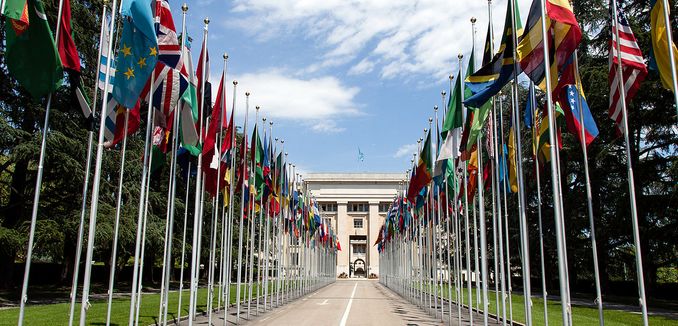For those of us who spent much of 2016, based upon then-candidate Donald Trump’s own bombastic declarations, worrying about the thrust of the foreign policy of a future Trump administration, President Trump’s address to Congress Feb. 28 provided welcome relief.
As ever, precise details were scarce and important shifts of direction went unacknowledged, but the underlying message was clear—and notably more centrist in orientation. Trump correctly identified “radical Islamic terror” as America’s prime enemy, but he also spoke of the importance of our “Muslim allies,” thereby offering the clearest clarification yet that we are not at war with Islam as a whole.
America’s key alliance with Israel—shunted aside by President Barack Obama, and veritably demonized by the far-right figures who endorsed Trump during the election—was underlined with enthusiasm. Trump also gave a thoughtful endorsement of NATO, pointing out that the alliance was forged in the bonds of two World Wars and the Cold War. This last point was particularly gratifying, as it emphasized the shared experience of fighting totalitarianism that remains the foundation of our alliances from the Atlantic to the Pacific: a time like now, when we face rogue regimes such as Iran and North Korea, is precisely a time to recall that history. Revealingly, mention of Russia—touted by candidate Trump as an ally in the war against Islamic State even as he poured scorn on NATO—was absent from the speech to Congress entirely.
If democratic principles are going to inform U.S. foreign policy—if, in the words of John Adams, American “benedictions and prayers” will reside “wherever the standard of freedom and independence has been or shall be unfurled”—then it is right that we recognize the value of our historic alliance with our fellow democracies. But affirming those principles shouldn’t blind us to to those international institutions that have dominated the post-World War II global order, yet are in sore need of dramatic reform.
The United Nations wasn’t featured as a topic in Trump’s address, but his new U.N. ambassador, Nikki Haley, has been making bold efforts to revitalize America’s support for Israel from the nadir of last December’s abstention on a Security Council vote that harshly criticized the Jewish state. Haley has made clear her distaste for the U.N.’s systemic bias against Israel; in that vein, the Trump administration is reconsidering its participation in the U.N. Human Rights Council (UNHRC), citing that body’s obsession with condemning Israel as the main reason.
Those who believe that a U.S. withdrawal from the UNHRC would be ill-advised and hasty should remember that the council has had more than a decade to get its act together. Created in 2006, the UNHRC succeeded the former Commission on Human Rights, a body that was similarly obsessed with Israel. At the time, there were vague hopes that the UNHRC would expend more energy on the gravest abusers, but the wildly disproportionate attention upon Israel has persisted. Nor has the UNHRC prevented grievous human rights abusers, from Venezuela to Saudi Arabia, from serving as members and participating in its decisions—because in the U.N.’s universe, having an appalling human rights record never disqualifies you from judging the human rights records of others.
Especially if the record that you are “judging” is Israel’s.
If confronting this blatant discrimination against a state that was first admitted to the U.N. in 1949 is to be a marker of the Trump administration’s approach to the international body, then it’s important to realize that the battle is much wider than simply the UNHRC. The deeper rot that needs to be addressed set in more than 40 years ago—Nov. 10, 1975, to be exact.
On that date, the U.N. General Assembly passed the Soviet-inspired Resolution 3379, equating Zionism with racism—a resolution that was rescinded in 1991. Less well-known is another resolution passed on that day—3376, which created the grandly named Committee on the Exercise of the Inalienable Rights of the Palestinian People, giving us the unwieldy acronym CEIRPP.
The “inalienable rights” that this committee represents include, as Resolution 3376 makes unambiguously clear, the “exercise by Palestinians of their inalienable right to return to their homes and property from which they have been displaced and uprooted.” Note the terminology used here—not “Palestinian refugees of the 1948 war,” but all Palestinians, including those born after 1948 in the Arab world, in Europe, in North America and in Latin America. It doesn’t take tremendous insight to realize that it is a formula for the elimination of Jewish sovereignty in the land of Israel—the very same formula that drives the BDS hate campaign against Israel and gives it the undeserved gloss of human rights.
For more than 40 years—longer, when you remember that the U.N. set up its first Israel-bashing committee, the…wait for it…Special Committee to Investigate Israeli Human Rights Practices Affecting the Palestinian People and Other Arabs of the Occupied Territories—yes, SCIIHRPOAOT—in 1968, the U.S., Israel and other democratic nations have devoted precious resources to the U.N. even as it deepened its institutionalized anti-Zionism. Since 1979, the CEIRPP has been serviced by a Division for Palestinian Rights, churning out an endless stream of anti-Israel propaganda through international conferences and publications.
(And no, there isn’t a division for Tibetan rights, or for Kurdish rights.)
All this costs around $6 million annually. In international organizational terms, that’s unremarkable, but when you consider how the money is spent, it’s little short of obscene. One would like to imagine that fact is one that President Trump will grasp instinctively, and act upon accordingly.
Ben Cohen is a Senior Editor at The Tower Magazine and the Director of Coalitions at The Israel Project. Publications he has written for include Commentary, The Wall Street Journal, Ha’aretz and Tablet. He writes a weekly column for JNS.org, a news agency serving the Jewish media. Follow him on Twitter @BenCohenOpinion.
[Photo: WikiCommons]




